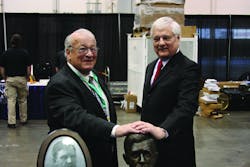May 24, as some of you may know, is National AMT Day. It took many years and the dedicated efforts of many people to get Congress to declare a day of recognition for the men and women who work tirelessly – and usually without recognition – to keep aircraft flying safely, day in and day out. The date selected for AMT Day is not a coincidence. It is the birthday of the father of aviation maintenance – and engineering and manufacturing – Charles E. Taylor.
Born in 1868 in a small town in Illinois, Charles Taylor went from working as bicycle repairman to the Wright Brothers to building the engine that powered their historic 1903 flight at Kitty Hawk. Talk about re-inventing yourself! But despite his unparalleled contributions to the history of flight, his accomplishments, like his name, are relegated to the dust bin of history.
Why does this matter? Some ask, with all the problems facing maintenance workers today, from outsourcing to pay cuts and layoffs, why focus on an obscure mechanic who lived and died in obscurity more than a half century ago? And I respond, sometimes patiently and sometimes more heatedly, because many of the problems today’s maintenance workers face is because few know and appreciate the contributions of our primo mechanic. And how is that, you say?
As important as the Wright Brothers were to aviation, Charlie Taylor’s contributions were of equally epic proportions. The failure to recognize the tremendous significance of his work in helping design, engineer, build, and ultimately maintain the first engine for the first successful powered flight was the beginning of a national, and global, indifference to the men (and now women) behind the machines. The dawn of aviation made heroes of pilots and Orville and Wilbur are household names to this day, more than 100 years after Kitty Hawk. Mechanics, like Charlie Taylor, were relegated to the back pages of history, if they even made it into the history books.
Not surprisingly, pilots have garnered greater public respect and appreciation which generally translates into better pay, better hours, and better working conditions. Recognition of the importance of work performed is a critical step in garnering better pay and better working conditions. I believe that raising Charlie Taylor’s profile in the public eye raises the profile of mechanics in general and leads to a greater appreciation for the critical functions they perform.
And the importance of a higher profile maintenance career is not just important to our current generation of mechanics. It’s also critical to recruiting the best and the brightest in high school and trade schools to continue in the maintenance profession. While we may retire from the profession one day, we will surely be flying for many years thereafter and expecting the same level of professionalism maintaining our flying machines.
So I would ask each of you to seek out opportunities to raise Charlie Taylor’s profile. Write letters to your local papers asking for coverage of Taylor’s birth date. Ask to speak about him at your local schools. And certainly attend commemorative events in your area. I will be.
About the Author

John Goglia
John Goglia has 40+ years experience in the aviation industry. He was the first NTSB member to hold an FAA aircraft mechanic's certificate. He can be reached at [email protected].
John Goglia is an independent aviation safety consultant and Adjunct Professor at Vaughn College of Aeronautics and Technology and regular monthly columnist for four aviation trade publications. He was an airline mechanic for more than 30 years. He has co-authored two text books (Safety Management Systems in Aviation, Ashgate Publishing 2009 and Implementation of Safety Management Systems in Aviation, Ashgate Publishing 2011).
